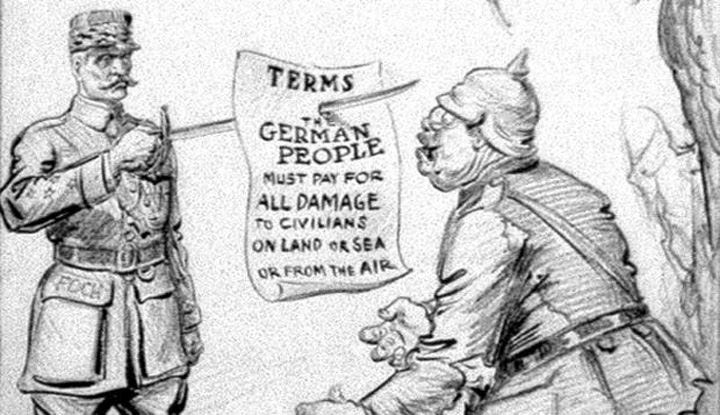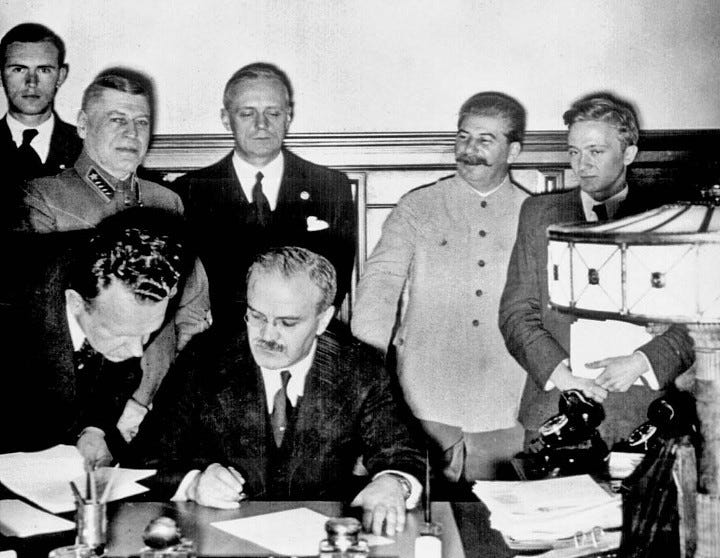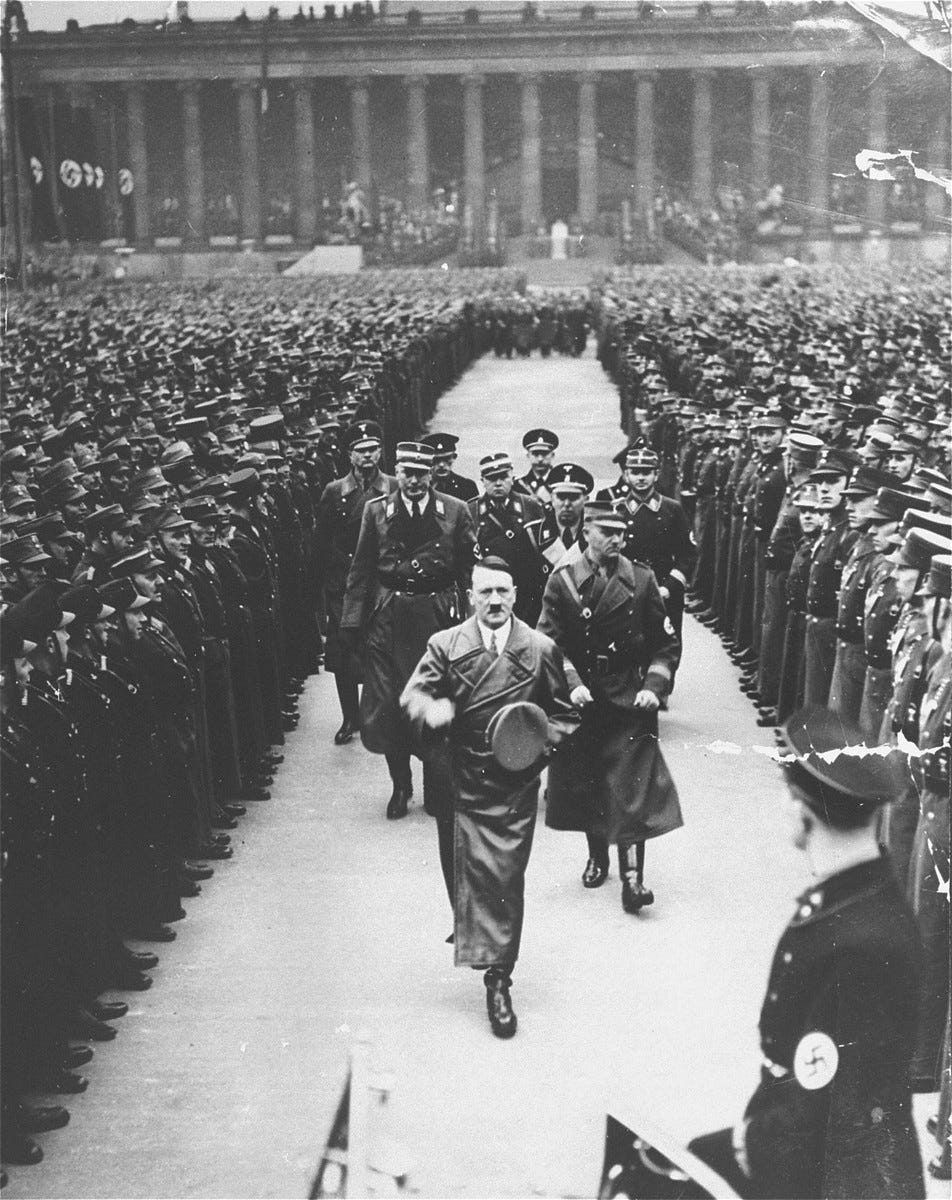Commenter KK’s impassioned defense of Russia against the (to him) “blind hatred” of Poles got me thinking. I’ve been doing some reading lately regarding the path to perpetual war in Europe—after all, the current conflict in Ukraine can arguably be seen as simply the continuation of a civilizational crisis in the West that first took military form in the Napoleonic wars. Certainly the inevitable centrality of Russia to Western Europe’s future can be dated at least that far back. What is different about this dynamic since WW2 is the overwhelming presence of the United States in the equation.
Just a short while ago I came across this interesting thread. It doesn’t actually go into exhaustive historical depth, but as a sort of outline focused narrowly on the origins of WW2 it raises a lot of interesting issues. My point is not to necessarily defend every argument that the author presents or omits. Rather, I want to use this thread to show that most of the going narratives are flawed in one way or another. For example …
Here at Meaning in History I have maintained that Russia’s actions in Ukraine are justifiable—even if the result is tragic for Ukrainians and Russians alike. I think Putin would agree with that. On the other hand, the understandable Russian tendency to assimilate the current conflict to their traditional narrative of the Great Patriotic War suggests that Russians have not fully come to grips with their Bolshevist past.
That’s not surprising—we can point to any number of countries whose national narratives gloss over inconvenient truths. America, Great Britain—they can certainly be counted among those nations that are nourished by non-historical narratives. Russia is no different, even if—my view—they are in the right in this current conflict.
Now, having blamed Poland for throwing in its lot with NATO—meaning, the Neocon faction currently running US foreign policy—to an absurd extent in the current conflict, KK’s impassioned attack on Polish “blind hatred” for all things Russian has led me to defend the Polish attitude as rooted to a degree in understandable—if misguided and counter productive—suspicions of Russia. Certainly Polish prime minister Mateusz Morawiecki’s recent pronouncement that Putin is more dangerous than Hitler and/or Stalin is beyond overheated. Nor do I wish to defend what appears to amount to a Polish policy of antagonizing virtually all neighboring countries. Nevertheless, Russia is finding, to its chagrin, that escaping from past history isn’t easy—especially when you’re the 800 lb. gorilla on the block.
So, in the interests of opening up a wider debate, I offer this thread—edited for length by removing many photos. The author is Big Serge, an Orthodox Christian who posts about “Russian history, military history, and general shenanigans.” Military buffs may be interested in another thread by Big Serge: A Thread on Blitzkrieg Myth.
A Thread on the Munich Agreement and the Stalin-Hitler Pact
The lesson that everyone thinks we drew from WW2 is some sort of trite rule about standing up to bullies, because if you try to "appease" them, everything will spiral out of control. This is wrong. (1)
Western understandings of interwar diplomacy are incomplete and factually questionable. For one thing, they almost always ignore the fact that Stalin was an extremely important actor. This wasn't a one on one between Chamberlain and Hitler - it was a three man drama. (2)
To start off, we have to go back to the Versailles Treaty. This was a colossal failure - not just because it was overly punitive against Germany and lacked enforcement, but also because it totally failed to account for the Soviet Union as a geopolitical entity. (3)
In the wake of World War One, both Germany and the USSR were pariah states. This gave them both a strong incentive to link up and cooperate. They started doing this almost immediately with the Treaty of Rapallo in 1922, followed by the 1926 Treaty of Berlin. (4)
The British quickly became concerned about German industrial prowess linking up with the Soviet Union's massive population and natural resources. Their plan to prevent this was to quietly soften the terms of Versailles and, in essence, rehabilitate Germany's pariah status. (5)
In 1925, Britain and France signed off on the Locarno Treaties, which normalized relations with Germany, and - paired with the Dawes Plan, which created a payment plan for Germany's reparations debt - went a long way towards resolving the postwar diplomatic tangle. (6)
Note that all of this predates Hitler's 1933 rise to power. This wasn't about "appeasing" Germany; the British were deeply concerned that maintaining Germany's pariah status would prompt a deeper German-Soviet linkup and create a dangerous anti-western continental bloc. (7)
Hitler's rise to power obviously complicated matters. Nazi Germany was overtly revanchist and rearming. What was not immediately clear, however, to either Stalin or British leadership was the extent to which they needed to revise their strategies to deal with Hitler. (8)
Chamberlain remained deeply concerned about the expansion of Soviet power into Central Europe. At one point, he expressed to Hitler his concern that if another war began in Europe, "only the communists" would benefit. (9)
On the other side of Europe, Stalin's main goal was, in fact, to nudge Hitler into fighting another war with the British and French. He frequently spoke of a second "inter-capitalist war" which would exhaust the west, while the USSR watched. (10)
Stalin understood that World War One had been the necessary precondition for successful revolution in Russia, and believed that another war would allow the revolution to spread further. The Red Army, he pledged, would be "the last man in the fight." (11)
So, we have Stalin hoping that Hitler starts a war with the western powers, and Chamberlain doing everything to avoid this. He would complain that Stalin was “stealthily and cunningly pulling all the strings behind the scenes to get us involved in war with Germany." (12)
But what does Hitler want? Well, succinctly, war. War is both central to his ideology, and furthermore he is gearing the entire German state for war and incurring huge economic costs to do so. After annexing Austria in 1938, he turns towards Czechoslovakia. (13)
Hitler works behind the pretext of bringing ethnic Germans into the Reich, but deep down he wants to do this militarily. The order that goes out to the army says that it is the Fuhrer’s “unalterable decision to smash Czechoslovakia by military action.” (14)
At the last hour, Chamberlain swoops in and calls Hitler's bluff. Hitler has been making demands of the Czechs that he believes they'll never agree to, but Chamberlain calls the bluff and gives Hitler what he's asking for. This is the famous Munich agreement. (15)
Calling this "appeasement" is very inaccurate. It was actually a clever move by Chamberlain that very nearly diffused the situation by stripping away Hitler's pretext for war. Hitler was actually furious and felt he'd been outmaneuvered! (16)
Hitler wanted to smash Czechoslovakia militarily, and Chamberlain threw a major wrench in the works. Hitler certainly didn't feel "appeased." His reaction? "That fellow" (meaning Chamberlain) "has spoiled my entry into Prague." (17)
However, Hitler's desire for military action is so insatiable (for many reasons, ideological, economic, and especially his belief that he had a world historical destiny, and his fear that he would die before it was accomplished) that he invaded the rump Czech state anyway. (18)
At this point, Britain and France grimly realize that Hitler is probably going to force a war on them, and they draw a red line on Poland. Ironically, Hitler's foreign policy is so erratic that he (bizarrely) has actually offered Poland an alliance! (19)
Throughout the late 1930's, Hitler tried to court Poland into joining him in an anti-Soviet crusade, bizarrely offering to swap Polish territory in the west for lands that would be taken from the USSR. Poland, baffled, refused. So, in early 1939, Hitler changed course. (20)
What nobody could truly grasp was just how erratic and anarchistic Hitler's foreign policy was. Poland could join as a junior partner in an anti-Soviet war, or it could be destroyed. In Hitler's brain, it didn't much matter which. This is a dog chasing cars. (21)
Rebuffed by the Poles, Hitler goes to the last remaining option for a deal and makes a pact with Stalin. This is the infamous Molotov-Ribbentrop pact. Having made the decision to destroy Poland, and with the Anglo-French bloc hardened against him, he needs at least one ally. (22)
Stalin is delighted, because this fulfills a deeply held foreign policy goal: keep the USSR safely at arms length from the coming war. Hitler is like a loose cannon on deck, and Stalin just wants to make sure it rolls away from him. (23)
“The conclusion of our agreement with Germany”, stated one memorandum from Molotov’s office, “was dictated by the need for a war in Europe.” For Hitler, it's even simpler: he wants to start a war, and Stalin is the only man willing to help him. (24)
The Hitler-Stalin pact was signed on August 24, 1939. On September 1, 1.5 million German troops are pouring into Poland. “In my life”, Hitler said, “I’ve always gone for broke." (25)
You can clearly see that what Chamberlain attempted was not "appeasement." There was a longstanding attempt to create a stable relationship with Germany to prevent them from linking up with the Soviets. This policy predated Hitler. (26)
Chamberlain was very rationally attempting to keep this policy viable after Hitler's rise to power. Nothing about this was cowardly or irrational. In fact, his core prediction was correct: the war did lead to Soviet takeover of Central Europe. Score one for Chamberlain. (27)
Ultimately, the story of interwar diplomacy is a story about both the British and the Soviets being unable to understand Hitler's ability to be a world historical driver of events, single-handedly dragging the continent towards war. (28)
Chamberlain could not understand Hitler's desire to spark a war at any cost, and Stalin underestimate German operational élan and the risk that the war would come to his doorstep sooner than he expected. (29)
I can't blame either Stalin or Chamberlain for their miscalculations. After all, Hitler and the German campaigns of 1939-41 were like nothing the world had ever seen before, or since.
Coda: I have never seen a compelling alternative course of action for France and Britain in 1938-39. It's unclear how, exactly, these countries, which were unprepared for war and had no borders in Central Europe, were supposed to save Czechoslovakia.












Mark, I am posting from London, Ontario. This is the first time I am commenting on your page. I read you regularly and admire you immensely given your own background and the sort of American patriot I imagine you are. On the subject that you write in this edition of yours, I simply wanted to point out to you some texts on the period, which you likely know about or have read, to contextualize your discussion. AJP Taylor's "The Origins of the Second World War" is in my view one of the finest studies in the diplomatic history of the twenty years between the two world wars, and despite the many books written since Taylor his discussion of the Stalin-Hitler or the Molotov-Ribbentrop Pact remains timeless. Then there is Isaac Deutscher's biography of Stalin covering the period especially from 1926 through the outbreak of the war, and how Stalin looking back prepared for the eventual contest with Hitler's Germany. Much has been written lately about Stalin, especially the two volumes so far published by Stephen Kotkin, but again in my view one of the most illuminating revisionist histories of Stalin-Trotsky struggles (and neocons being the progeny of Trotskyites) is "Stalin: The Enduring Legacy" by Kerry Bolton. Stalin's crimes are now part of history, as is that Hitler or Mao. The point I want to leave you with is Trotskyism represented the ideology of Marxist/Bolshevik world revolution, and Stalin's policy of "socialism in one country" represented in retrospect the defense of "national sovereignty" of what by 1941 became Mother Russia. In our time the neocons have been pushing "world revolution" under the umbrella of American imperialism (unipolar hegemony post-Cold War) that fuses with the Globalist Agenda of the WEF pushed by the EU and the UN's Sustainable Development Goals to impose the concept of one borderless world and obliterate nation-state sovereignty. The neocons are the reincarnation of Trotskyites and their war against Russia in Ukraine ironically is "karmic", the repeat of the period when Trotsky was still a force after Lenin in Moscow till he was expelled from the party, and then his ideology of world revolution fused with the Cold Warriors's ideology of turning America into an imperialist power subverting the very foundation of the republic and the warnings of the founding fathers. The war in Ukraine is not simply any longer a war against Russia, which it is, but it is also a war that American patriots have to win to save their republic from the neocons and their Globalist agenda or America will no longer remain the great republic and bastion of freedom based on individual rights as founded in 1776.
God bless.
Salim
(p.s. I would love to communicate with you if and when time permits either of us. My email address is: smansur26@gmail.com)
I knew a long time ago that there were many and devious reasons behind the diplomatic maneuvering in the 1930s. So everybody, including eventually Hitler, miscalculated. I will give them this. Compared to our current crop, they were all geniuses and had rational motives. Nowadays....except for maybe Purin, who is banking on our stupidity.